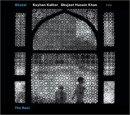World Music Stunner
Born in 1997, this ensemble of Silk Road artists entered a series of albums for Shanachie Records over three subsequent years that merged Persian and Hindustani concert music ideas into a new stream of classical balladry and improvisation. As satisfying as the studio recordings proved, none of these equal the pinnacle of beauty or concentrated metaphysic disclosed in The Rain, a live recital from May 28, 2001 in Bern, Switzerland. Released by ECM Records, international watchdog for established top-end performers breaking from tradition, it was perhaps only a matter of time before Ghazal received the opportunity to have their experimental sound captured in palatial acoustic splendor.
Heretofore, Ghazal have been true to their name creating romantic poetry songs, plus instrumentals, and mixtures of these with exceeding discipline, and a crucially heart-centered touch. Shujaat Husain Khan, the group's sitarist and singer, a direct descendent in a royal line of North India musicians, has found common aesthetic and emotional ground with Kayhan Kalhor the accomplished kamancheh player and composer from Iran. Together they've woven mostly anguished but sometimes also exalting meditations of love.
For those familiar with Ghazal, this new recording does not submit any new base material. Instead, three previous compositions, "Fire in My Heart", "Between Dawn and Dawn A New Truth" and "Traces of the Beloved", appear here in condensed but refined versions, whose titles have also been reduced, to stage list shorthand "Fire", "Dawn" and "Eternity". On display, as in studio efforts of the past, the same comfortable yet still searching dialogue between two sensitive improvisers. Only, here, that live communication of agreement and ornament exchange is almost constantly fluid and clairvoyant—helped by a generously attentive Swiss Radio DRS audience.
What's special about this 53-minute concert is how silkily it sketches inner agony and bliss, and in the process enacts the subtle, age-old transition from earthly pain to sacred joy. Heard either as one raga, or dastgah, two songs travel in heart-strained minor keys but give way to the major key glory and wordless reconciliation of "Eternity". Through this tripartite structure, and confirmed concretely in the last third, Khan, Kalhor and tabla accompanist Sandeep Das have chanced upon what seems like a new kind of ecstatic device.
Much south Asian classical music typically proceeds through different gears, beginning with slow elucidations, ending with fiery racing climaxes, and all in the same mode or key. But, the brothers of different lands have enlisted three modes for the set and do not accelerate too rapidly in the last, as can be customary for finales. They instead use simple circular phrases and variations of rising-returning figures, to articulate an amazing marriage of motion and serenity in just shy of twenty unusually patient, merciful minutes. Following a half-hour plus of parched sadness, the final track is an effulgent, tear-producing, architectonic flood of consonance. As desert becomes sea, Ghazal proceed on course for shores of the infinite, crossing by humble rowboat slow and steady, all but until the very end. As the name “Eternity” would imply, it is a wonder to behold, but not, it should be noted, without the context of what came before.
Instruments that might be texturally questionable together, always wind up sounding like long lost relatives somehow after the German label's cavernous yet delicate treatment. Resident recording engineer Andy Mettler has captured intimate images of the brassy sun-toned gourd-lute, rustic woody spike-fiddle, tactile hand drums, and smooth vocals at the resonant Chambermusic-studio at Studio Bern, and judiciously amended the live-mix with state-of-the-art digital reverb. The enhanced harmonic shadow is as sumptuous and flattering as is probably sensible or desirable. And the acoustic boost clinches the realization of sublime visions and powerful medicine, when the three gifted musicians find themselves on a perfectly pithy roll before a roomful of indeed fortunate ears.


